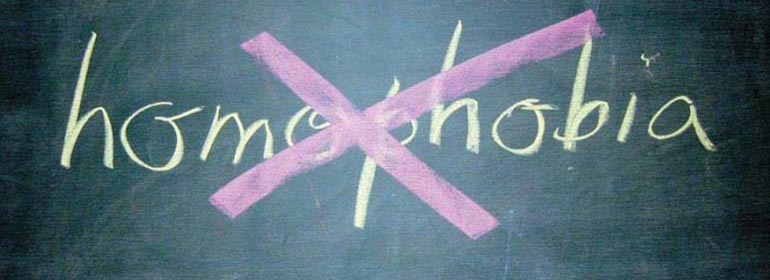I am a homophobe. This is not something I chose to be. Neither was I born this way. My homophobia was nurtured by the culture I grew up in, says Dr Roddy Flynn.
In 1970s and 1980s Ireland, my ideas about homosexuality were predominantly informed by camp figures of ridicule in popular culture: Frankie Howard in the Carry On movies or Mr Humphries in Are You Being Served? In Irish popular culture, the very concept of homosexuality was barely visible.
As it slowly dawned on me that homosexuality was a feature of the world I actually lived in, its status as an illegal, underground phenomenon gave rise to associations of sleazy shenanigans in dark bars. I barely knew what paedophilia was, but yet somehow a subtle association between it and homosexuality had wormed its way into my unconscious. As with all unknown quantities, I regarded homosexuality with a mixture of suspicion and fear: these are roots of my phobia.
Before I’d left primary school, playground catcalling had already begun to invoke the fear of homosexuality. By secondary school ‘gay’ was no longer a term of abuse: it was the term of abuse. From the ages of 12 through 18, the denigration of someone as ‘gay’, ‘faggot’, ‘bum chum’ (we were infinitively creative in devising new synonyms), regardless of their sexual orientation, was routine, unquestioned and monolithic.
In hindsight, I can’t but regard my use of the word ‘gay’ during childhood as anything other than homophobic. That ‘everyone was doing it’ is not a defence, it is precisely the point: this ubiquity pointed to a society so intrinsically homophobic that such behaviour could be taken for granted.
I grew up. As a young adult, with access to a wider set of people and ideas, I concluded that being something other than heterosexual was probably okay. I even began to meet gay people. Some were – to me – disturbingly camp, some weren’t. It would gradually dawn on me that even being camp might be okay. But even though I rationally knew there was nothing wrong with ‘them’, I still felt cautious around gay people. I sought to convey the notion that I was cool with their identity, but also that I was straight so, you know, keep your distance.
Unconscious Prejudice
I kept growing. I came to self-identify as progressive and liberal, even though for a long time I had to consciously perform the day-to-day expressions of that stance. And gradually, over time, the performance faded and it became who I am. But, even now when I encounter a new acquaintance who is gay, I experience an internal shift. I cannot avoid re-categorising them, seeing them as different. I have to consciously reflect on how this knowledge may unconsciously prejudice (literally pre-judge) how I assess them, how I relate to them. Perhaps it is a legacy of my cultural formation that though I have gay friends and colleagues, none of my best friends are gay.
The nature of my work requires me to reflect on questions of identity and its formation at length. As a dad, I try to inculcate in my own daughters some sense of the workings of patriarchy and emphasise that there is nothing about their gender identity that limits who they can be. Happily they appear to be internalising a completely different set of ideas about gender and sexual identity than the ones I did.
But I still retain elements of homophobia – that ‘reset category’ button that gets automatically pushed when I realise someone is gay. And, as anyone who spends five minutes in an Irish school playground today will tell you, ‘gay’ remains a ubiquitous term of abuse.
Chilling Effect
One of the consequences of the ‘Pantigate’ controversy was its chilling effect on discourse around homophobia and Irish society. It has, almost literally, become impossible to discuss how the kind of culture I have described influences how we think about same-sex marriage. While I don’t believe that supporting a No vote automatically means one is homophobic, neither do I believe that homophobia is a thing of the past or irrelevant to this debate. Cultural influences are hard to evade: recognising them and identifying how they shape one’s subjective position is prerequisite for a meaningful participation in a debate on marriage equality.
Secret No Voters
Much has been made of the putative existence of a cadre of secret No voters who feel unable to publicly espouse their position because they will be bullied, especially via social media. This is possible but is more a reflection on the nature of social media where even videos of cute kittens can produce the most extreme responses. There has been some vile stuff written in online discussions of the referendum and it has come from both sides.
But I wonder whether for at least some of those unwilling to acknowledge their stance in public, this is driven not so much by fear of reprisal but shame – shame at the recognition of their discomfort with other sexual identities. It is a discomfort born of a long history of legal structures and cultural formations, which have cast LGBT individuals as ‘othered’, as outside the ‘circle of we’.
The current inegalitarian definition of marriage as the exclusive preserve of heterosexuals is one important example of these structures. Voting Yes will not usher in an egalitarian Utopia from May 23, but it will remove one important bulwark enshrining and legitimating inequality. Anything that chips away at the foundation of the homophobia I grew up with is a good reason to vote Yes.
Dr Roddy Flynn, School of Communications, DCU
© 2015 GCN (Gay Community News). All rights reserved.
